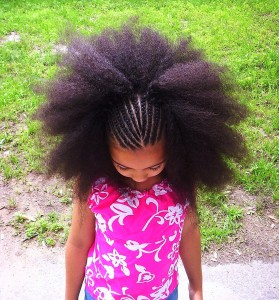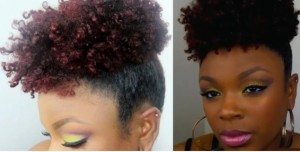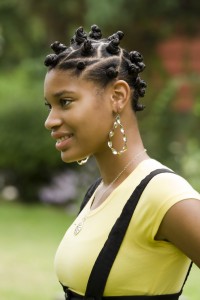Introduction
There are many forms of discrimination present in today’s society. This is a reflection of the long history of discrimination the world has been present for and condoned. Some prejudices have withstood time and are still active today, while others are fairly new. The section of discrimination I have been researching is one that has been around for a long time. However, it finally has a name and people willing to fight to combat it. The faction of discrimination I have chosen is curlism.

Picture By: commons.wikimedia.org
Curlism is the discrimination against natural hair and certain natural hair patterns, particularly the natural curl pattern of Black females. It is a term coined by Solange Knowles due to the movement of natural hair and hair-typing that has come to light in the last few years. Curlism is the negative effect of people believing that long, straight, and flowy hair is the better hair type and style. It states that natural hair is unprofessional, untidy, or unkempt. This discrimination lowers self-esteem, self-worth, pride in one’s culture, and much more. Curlism is all around us and has a presence in our everyday lives.
It is a controversial topic because curlism has come to the light as another way to discourage black people, especially black females. The topic has gained recognition because hair-type is also a factor for Black girls in the working world. It is another type of discrimination that many people don’t want to recognize nor believe is real. It is something that is perpetuated by the masses but not acknowledged. It seems like anything related to Black people is either unworthy or a taboo when done by Black people.
A Closer Look
Black/African American females (especially of the working age) and some males are mostly affected. To a slightly lesser degree, girls with generally curly hair are affected by curlism. Companies and organizations that deal with hair products and services are perpetrators of the discrimination. Certain employers are also guilty of this discrimination. Frequently, people with the desired hair visual (straight or loose hair) are additionally guilty curlism. Caucasian people are also supportive and commit curlism. Even schools are guilty of curlism. This discrimination has affected some of the largest aspects of a person’s everyday life. It has got to come to a conclusion.
There is data out there in the United States that can be collected with the right search approach and even more facts that can still be unearthed and prove. However, there are already data and facts that can be utilized for the purpose

Picture By: www.aliexpress.com
of the post (even though I wish more research would be done because there is too little in my opinion). Since 2011, the amount of girls refusing to use relaxers on their natural hair has risen to 36%. This is part of the reason why we have seen so many more girls with natural hair. Nevertheless, not all facts/data bring good feelings to ourselves. Private companies are allowed to enforce their own dress codes which can prohibit girls with natural hair from being employed. In addition, Caucasian people frequently point out how natural hair is different by asking “How did you get your hair that way?” I have my own experiences with this as I have my hair natural as well. Just a few days ago, a Caucasian friend of mine asked me that very same question. I have to frequently tell those people who ask this question that my hair grows out of my head like this. It points out this idea that people with natural curly hair are so abnormal compared to people with straight hair. It sets me apart from others in a glaring way. Not to mention the fact that this perceived separation can keep people like me from finding employment. These facts bring the feelings of anger and sorrow. These reaction to hair of all things on a such a large scale must be stopped.
Racism, colorism, judgmental nature, fear of things that are different, and jealousy are some of the causes of curlism. Lowered self-esteem, lowered sense of self-worth, loss of pride in self and culture, unnecessary pursuit of an ideal that damages one’s hair, misplaced envy, loss of opportunity (in work field, school, and life), etc are some of the effects of curlism. It is happening all over the United States. This is a national issue because black people and people with curly hair are diffused throughout the country. Everyone is an individual, so everyone has their own reactions to this discrimination. However, curlism is still a form of discrimination and no one likes that. Therefore, no positive reactions will be displayed.
A Call To Action
Solution is the word that comes to mind when we think of a problem. There needs to be more understanding of individuality. It is more than just visual appearance (i.e. hair) that makes one professional. As other ethnic groups are accepted for their culture, people with curly hair need to be accepted as having their hair as their culture. There needs to be more education on both hair and culture in order to bring about change. In that respect, there is now a movement to bring awareness to the reality that is curlism. Many people are speaking up about injustices and people are working towards correcting said injustices. There are still many instances where curlism is disregarded or seen as acceptable, therefore no action is being taken to combat anything. In regards to certain topics, there is really nothing being done about curlism in the workforce nor in the media. This generation already has the power to improve the

Hair Styles: Chiney Bumps, Nubian Knots
Picture By: www.flickr.com
situation. It might just have the power to fix it. I propose breaking the stereotypes about long, straight hair being the most desirable hair type by causing people with that type of hair admit the amount of times they have tried a hairstyle related to curly hair or had to work to get their hair perfectly straight. If we all think hard enough, and put in enough effort, we can make a definite change in the reality that is curlism.
Reflection
As a Black female, I know that I am about to enter the fire that is the working world. Instead of my skill, my hair, my skin, the way I speak, as well as the way I conduct myself and dress will come into play as to whether or not I can do a job. I will also face comments about my hair from the bold people who believe that they are mature because they have now entered adulthood. I will face a number of different types of discrimination. However, if I can bring awareness and recognition to at least one of these prejudices, I can say that I have done a small part and contributed. I will continue to make even bigger efforts in the future especially in the fight against curlism. I love my hair too much to let this stuff slide by.
Bethany, You did a fantastic job on this post and with your presentation. Your research and writing are very thorough and organized. The topic is very relevant and, as you stated, often overlooked. The post is in-depth and contains a great balance of evidence and commentary. You did a wonderful job of citing your sources for your evidence and your images. Your spoken word poem was icing on the cake and your presentation was outstanding. You should be very proud of the work you’ve done this semester.